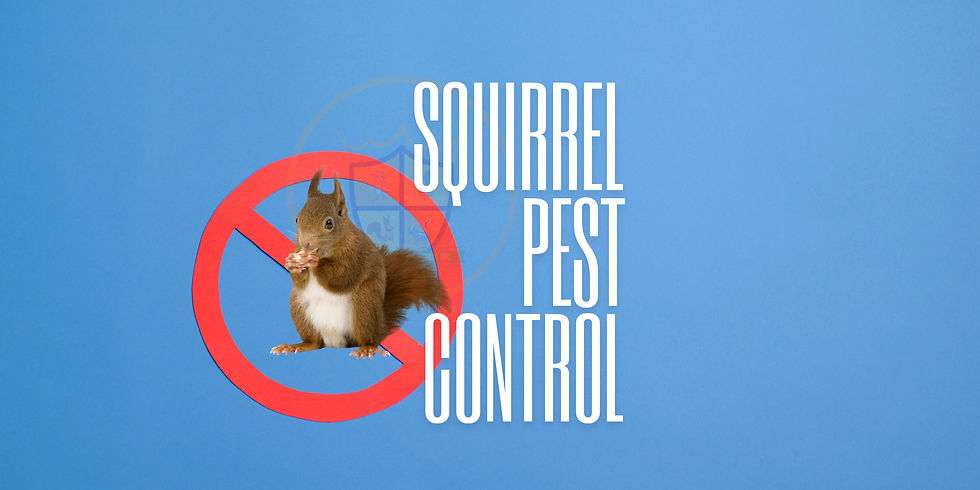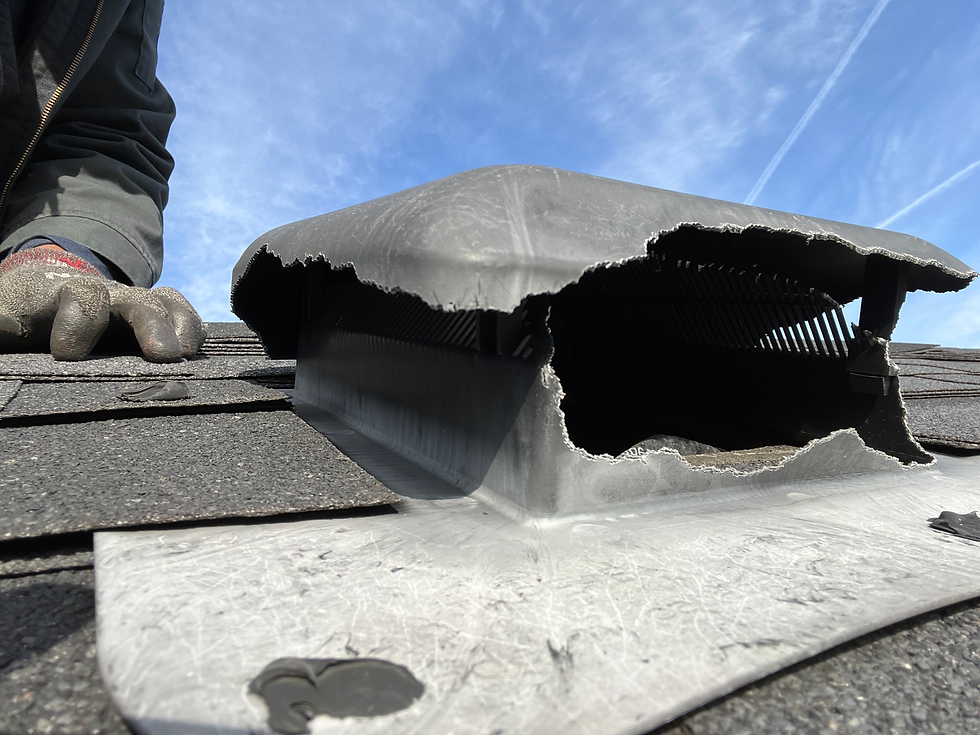Squirrel Pest Control: Comprehensive Strategies For Wildlife Issues
- Brampton Wildlife Control Inc.

- May 4, 2024
- 8 min read
Updated: Jul 12, 2024

Understanding Squirrel Behaviour and Habitats
In Ontario, there are three main types of squirrels: tree squirrels, ground squirrels, and flying squirrels. Tree squirrels are the most common kind, and the most common types are Eastern gray squirrels and red squirrels.
With their nimble movements and bushy tails, squirrels are commonly found across various landscapes, including urban areas, in areas with nearby trees or forests, and parks. These creatures are primarily active daily, making them highly visible pests around homes and gardens. Understanding their behaviour is crucial in developing effective control strategies for homeowners.
Living in an urban sprawl like the Greater Toronto Area means sharing space with the abundant wildlife surrounding us. As more and more homes are built, however, the natural habitats of these creatures begin to diminish. Squirrels, in particular, have been known to seek refuge in homes by making their way into crawl spaces or roof lines.
The result? Costly damage to your home's infrastructure could include bent metal flashing and entry points (holes chewed) in the roof itself. Unfortunately, as green spaces become rarer, the chance of finding a squirrel's den on your roof increases.
So, what can be done to prevent this? It is important to ensure your property is well-maintained and any potential entry points are preventatively sealed off. Enjoy the beauty of nature from a distance, and keep your home safe and secure!

Signs of Squirrel Infestation
Detecting a squirrel infestation early and hiring a reputable squirrel removal services company can prevent extensive damage and the associated costs of control and repair. Key signs include:
Noise and Movement: Have you heard strange scratching or scurrying noises in your attic or walls? Do you hear it, particularly in the mornings and evenings? Chattering or crying? If so, you might have a squirrel infestation. It's important not to ignore these signs and to take immediate action. Squirrels can be more harmful than you think and cause severe damage - they can chew wires, destroy insulation and even store food in your attic. If they gain access through your roof vents or other ventilation systems or drip edge, they can cause significant squirrel damage. So, it's better to be safe than sorry and check for signs of a squirrel infestation as early as possible before the problem becomes too big to handle. Consider hiring a reputable squirrel removal service to set a one way door to protect your property and ensure peace of mind.
Damage to Outdoor Areas: Detecting signs of a squirrel infestation early on your property could spare you from costly control and repair issues. Signs of an infestation can include sharp teeth marks or bites out of plants and vegetables in your garden, dug-up bulbs, and disturbed bird feeders. Some might think of hiring companies to set live traps to solve the problem, but it can be very expensive. Instead, there are much easier and safer ways to deter squirrels from your property. For instance, mothballs can be an effective repellent or any of the other household items we've listed in this article. Don't wait until the damage is done; check the house's exterior for any damage and look into simple remedies that may get them to move off. Call Brampton Wildlife Control if you have any questions or concerns.
Structural Damage: Squirrels are fun to watch from afar, but when they decide to make a home in your house, this can cause extensive damage and many problems. As a homeowner, knowing the early signs of squirrels is essential. Squirrels gain access by chewing openings in various areas, and signs could include gnaw marks on wood decks, damaged roof shingles, and holes in siding. Squirrels are experts at squeezing in through access through easy access points such as gable vents, roof vents, and any other access point in your home. This puts your home at risk and can cause house fires if they start gnawing on your electrical wires in the attic. By identifying these signs early, you can rid your home of these pesky critters before they cause extensive damage. Have a highly regarded wildlife control company install squirrel prevention wire mesh on any vulnerable areas of your roof, i.e. over roof vents, soffit and roofline corners, and the side vents of your house. Recognize the signs of an issue so you can act fast and hire a reputable squirrel removal company to get rid of squirrels once and for all.
Squirrel Droppings: If you suspect a squirrel control problem, it's important to act fast and hire a reputable squirrel removal services company. Squirrels can cause extensive damage and lead to expensive control and repair costs. One of the key signs of a squirrel problem is the presence of squirrel droppings. Typically oblong, these droppings may accumulate in or near the nest. It's important to use gloves and a shovel when disposing of squirrel feces, as they can carry diseases. When dealing with wild animals, it's important to prioritize humane methods and protect yourself and others from harm. Don't delay in gaining access to professional squirrel removal services to prevent further damage and keep your home safe.
Preventative Measures for Squirrel Control
To effectively manage and prevent a squirrel problem inside your home, consider the following preventative strategies:
Secure Food Sources: Ensure that garbage bins are tightly sealed and if possible kept inside a garage or shed until garbage day arrives. Make sure bird feeders are equipped with squirrel-proof features. You could install a free-standing bird feeder on a metal pole.
Trim Tree Branches: Reduce access to buildings by removing overhanging tree branches that hang close to the roof or upper levels of the structure.
Install Squirrel Guards: Use metal collars on trees and posts to prevent squirrels from climbing.
Repair Entry Points: Seal any holes or cracks in the exterior of the building with sturdy materials to deny squirrels entry. However, if squirrels have made their way inside already, a reputable squirrel control company can install wire mesh one way doors to evict them.
Humane Squirrel Removal Techniques
When prevention is not enough, humane removal becomes necessary. Here are some effective techniques:
Live Trapping: As much as homeowners strive to keep squirrels out, these furry little creatures sometimes find their way in. When prevention fails, it's vital to implement humane removal techniques. The most effective method is to place traps near the access points and patiently wait for the squirrel to wander in. Once trapped, relocate the animal following local wildlife regulations. Keep in mind that during baby season, it's crucial not to set traps as you could inadvertently separate a mother from her young trapped inside. With these tips in mind, homeowners can safely remove squirrels without causing harm to the animals or themselves.
One-Way Doors: Nobody likes having squirrels or rodents in their home. When diy prevention methods fail, humane removal techniques become necessary. Fortunately, there are many effective methods for humane removal. One popular technique is installing a one-way door at the animal's entry points. Squirrels leave to get food or water, and the door closes which prevents re-entry. A reputable wildlife control company can handle this task with ease. It's important to note that baby squirrels are often more difficult to remove, especially during baby season. However, a thorough attic search can locate and remove newborn baby squirrels safely and humanely. Remember, taking action before the squirrel causes damage to your property is essential. With the right methods, you can be sure the animals are removed without harm.
Professional Squirrel Removal Services
For persistent or large-scale infestations, professional pest control services offer several advantages:
Expertise and Experience: Professionals possess the necessary skills and experience to handle squirrel infestations effectively and humanely. They know that removing squirrels sometimes involves getting up in the attic for the babies as well.
Advanced Techniques: Wildlife control experts can access more sophisticated tools and techniques not typically available to the general public. They can recognize other areas that might be vulnerable to becoming possible entry points.
Prevention of Future Infestations: Professionals can provide comprehensive solutions that include removal and preventative measures to ensure long-term control. They can attach wire mesh over roof vents, chimneys, side air vents, or any other areas that offer easy access to squirrels or other animals.
Natural Deterrents and Repellents
In addition to mechanical and physical strategies, natural deterrents can help keep tree squirrels and ground squirrels away. Some effective natural repellents include:
Peppermint Oil: When it comes to keeping unwanted wildlife away from your property, natural deterrents and repellents can be highly effective. One such option is peppermint oil, which has a strong scent that squirrels find repulsive. So, if you're dealing with the eastern gray squirrel or other squirrels, soaking some cotton balls in peppermint oil and placing them in the areas they frequent can help drive them away. This keeps other squirrels from entering these areas and deters other wildlife from coming near. With natural repellents like peppermint oil, you can create a peaceful, wildlife-free environment that is safe for you and your family to enjoy.
Cayenne Pepper: Cayenne pepper, in particular, is an excellent option. A simple paste made with cayenne pepper and water can be rubbed on decks, fences, porches, and other areas at ground level to discourage squirrels from creating entrance holes and gaining access to your property. So, if you're looking for an easy and natural solution to your squirrel pest control problems, give cayenne pepper a try.
Safflower seeds: It sometimes seem impossible to prevent squirrels from invading bird feeders without resorting to either live trapping or poison baits. However, there are natural deterrents and repellents that can help keep these pesky critters at bay. Squirrel prevention sometimes starts with just some very simple tricks to try. One effective method is to switch out sunflower seeds for safflower seeds. While squirrels love sunflower seeds, they have an aversion to safflower seeds. Plus, birds adore safflower seeds, so it's a win-win situation. Incorporating safflower seeds into your backyard bird feeder can attract beautiful birds while deterring squirrels from harassing your valuable garden beds.
Capsaicin: Another effective way is to use capsaicin, a compound in chilli peppers that can be added to bird seed. This method is beneficial since it will deter squirrels without affecting the birds, who can still happily feast on their seeds. With this natural deterrent, you can keep squirrels away while still appreciating their playful nature from a distance.
Predator Urine: Regarding squirrels living on your property, various methods exist to consider. While mechanical and physical strategies may work for some, others may opt for natural deterrents. One option that can be effective is utilizing predator urine, which can create the scent of another wild animal nearby (wolf, bear, fox, etc.) and help prevent squirrels from getting close. However, it's important to note that this method may not be for everyone due to how it’s collected and processed. Some may prefer more humane alternatives or, at the very least, look into how predator urine is obtained and decide for yourself.
Legal Considerations in Squirrel Control
When implementing live squirrel control measures, it is important to consider local wildlife laws and regulations. In many regions, squirrels are protected under wildlife conservation laws, which may regulate the methods for removal or deterrence.
Conclusion: Effective Squirrel Management
Effectively managing squirrel populations requires a combination of understanding squirrel behaviour, implementing preventative measures, using humane removal techniques, and, when necessary, enlisting the help of professionals. Adopting a strategic approach to squirrel control can protect your property from damage and reduce the likelihood of future infestations. Persistent and adherence to recommended practices are key to successful squirrel management.









Comments